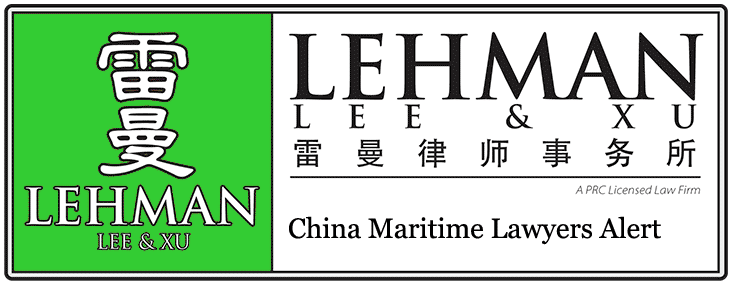
 |
|
LEHMAN, LEE & XU
|
|
China Maritime Lawyers Alert
|
|
November 2011
|
The China Law News keeps you on top of business, economic and political events in the China. |
|
|
|
In the News |
China issues fresh warning regarding exploration in South China Sea |
Platts |
Law Unable To Punish Bohai Culprits |
Original article: [Chinese] |
Local companies selling bunker fuel may double |
Bloomberg News The Ministry of Commerce is formulating the plan after it received applications this year from five companies looking to sell bonded bunker fuel, Zhou Yiqing, manager of the bunker department at Sinopec Fuel Oil Sales Co, which owns a unit licensed to sell such supplies, said in Beijing yesterday. China's demand for bunker, or fuel used to power ships, is rising along with the nation's growing need for raw materials and rising export of finished goods. The world's fastest-growing major economy may need more than 20 million tons of bunker fuel a year by 2015, Zhou said. The five companies that applied for licenses include state-owned China National Aviation Fuel Group Corp, the country's biggest jet-fuel distributor, China Arts Huahai Import and Export Corp and Shanghai Fuel Co, Zhou said. Officials at the three companies didn't immediately respond to telephone calls from Bloomberg News. Five Chinese firms are now licensed to sell bonded bunker fuel, Zhou said. The companies include China Marine Bunker (PetroChina) Co, also known as Chimbusco, and a unit of China Petroleum and Chemical Corp in Zhoushan, Zhejiang Province. |
China Law News |
CONTENTS
_______________________________________________________________________
China's legal system gets refinedChina Daily The country's top legislature is removing and modifying "a great number of" administrative and local regulations that run contradictory to the Constitution and national laws, a senior legislator said on Thursday. "We're cleaning up a great deal of such regulations ... that implicate local interests in every provincial-level administrative region," said Xin Chunying, deputy director of the legislative affairs commission of the National People's Congress (NPC) Standing Committee. She said the exact number of such regulations will be released when the job is done. Continue reading at: http://www.chinadaily.com.cn/china/2011-10/28/content_13991844.htm
China's top legislature to read draft amendment of Civil Procedure LawXinhua The Standing Committee of the National People's Congress (NPC), China's top legislature, opened its bimonthly session, during which lawmakers read a draft amendment of the Civil Procedure Law for the first time. The lawmakers will also review draft laws and amendments concerning mental health, military service and clean-production promotion in the session to run from Monday to Saturday. The draft resolution on strengthening anti-terrorism efforts, as well as government reports on affordable housing and environmental protection, will also be submitted to the legislature. The lawmakers will also review reports from the Supreme People's Court and the Supreme People's Procuratorate on promoting justice in judicial systems during the session. Continue reading at: http://news.xinhuanet.com/english2010/china/2011-10/24/c_131209283.htm China to increase punishment for violations of work-related illness lawChina's top legislature on Monday reviewed an amendment to a law regarding occupational illnesses that sets harsher punishment for violations. Licensing authorities for construction projects will be given criminal sanctions if their actions violate the law, according to the draft amendment to the Law on Occupational Illness Prevention and Control that was submitted to the National People's Congress (NPC) Standing Committee for its second reading. The authorities may be fired if they arbitrarily approve licenses for construction projects, the draft amendment states. The draft amendment states employers who violate the law and do serious damage to an employee's life or health will be fined between 100,000 yuan (15,689 U.S. dollars) and 500,000 yuan. The fine's ceiling was previously set at 300,000 yuan. Continue reading at: http://news.xinhuanet.com/english2010/china/2011-10/24/c_131209735.htm China cuts tax to boost small businessesBEIJING - China carried out major tax cuts on Tuesday designed to benefit the nation's crisis-hit small and micro-sized firms - including street vendors - and also help curb inflation. The value-added tax (VAT) threshold for small enterprises increased to between 5,000 yuan ($791.14) and 20,000 yuan, in terms of monthly sales revenues, from the previous threshold of 2,000 to 5,000 yuan, according to a statement released by the Ministry of Finance (MOF) on its website. Meanwhile, the threshold for levying the business tax for small enterprises was raised to 5,000-20,000 yuan from the previous 1,000-5,000 yuan. The new threshold is designed based on the business traits of small and micro businesses and aims to relieve their tax burden, said Bai Jingming, a researcher with the MOF. Continue reading at: http://www.chinadaily.com.cn/china/2011-11/01/content_14018198.htm 26 Nations Defy Europe on Airline Emissions26 Nations Defy Europe on Airline Emissions China, the United States and 24 other nations backed a declaration on Wednesday urging that their airlines be exempted from the European Union’s Emissions Trading System. The move at the International Civil Aviation Organization, an arm of the United Nations, is another challenge to environmental leadership by the European Union, which has failed in its efforts to get some of the biggest polluters in the developed world to adopt crucial parts of its agenda for tackling climate change. The declaration said the European directive was “inconsistent with applicable international law” and that the signatory nations would work together to oppose it. Continue reading at: http://green.blogs.nytimes.com/2011/11/02/26-nations-defy-europe-on-airline-emissions/ |
|
|
|
|